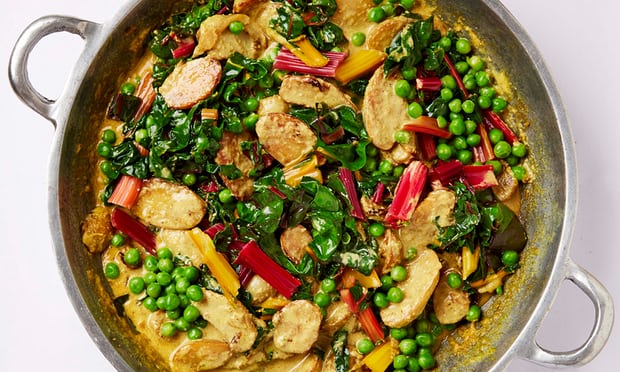The new vegan: potato, chard and coconut curry
recipe
Once upon a time,
vegans were a relatively small bunch, at least in the UK, but no longer: the
meat-free way of life is as alive and kicking as the animals it cherishes, on
supermarket shelves, in restaurants and in the kitchens of hundreds of
thousands around the country.
Vegetables are
the backbone of my diet, because I was born into a Gujarati family.
Although Gujarat looks out on to the fish-filled Arabian sea, many of its 62
million inhabitants are vegetarian by way of a promise made thousands of
years ago to live according to the Hindu principle of ahimsa, or non-violence
towards all living beings.
I didn’t grow up in
Gujarat, but in Lincolnshire, the vegetable heartland of this country. Behind
our house was a potato factory, and down the road fields brimming with cabbages
like boulders and blushing beetroots; a lot of that produce ended up on our
table, quickly cooked and lightly spiced. Somewhere in the middle of this
cross-cultural Venn diagram, I developed a love for a simple, fresh diet
without much meat.
A confession: I
remain a part-time vegan in that I eat mostly vegetables, but occasionally eat
meat, fish or dairy. But I want to eat and cook this way more, and to make this
a column for everyone: vegans after fresh ideas, part-timers like me, even the
agnostic. To the uninitiated, vegan recipes can seem complicated, rules-based
or full of pseudo-science. (I promise never to tell you why cavolo nero is
good for you, but I will tell you how to make it delicious.) I don’t think it
needs to be this way; after all, many cultures – from India to Indonesia, the
Mediterranean to Mexico – make vegetables the main event without making a
song and dance about it.
I’ll be bringing
you recipes from India, my centre of gravity, and also from around the world –
because good food doesn’t stop at a border.
New potato, chard and coconut curry
Advertisement
This dish started
life in Karnataka, on the
west coast of India. It’s a spin on saagu, a curry of whatever vegetables
happen to be in season, cooked gently in a soothing, spiced coconut sauce.
It’s filling enough to be restorative, quick enough to cook midweek and
light enough to be good company on a summer’s night. If you don’t have a
blender, chop the garlic, ginger and chillies as finely as your fingers
and knives will allow, and cook for an extra five minutes. Serves four.
1 tsp cumin seeds
2.5cm piece ginger, peeled and roughly chopped
2 green finger chillies, roughly chopped
3 garlic cloves, peeled
30g unsweetened desiccated coconut
400ml tin coconut milk
3 tbsp rapeseed oil
1 large onion, peeled, halved and thinly sliced
600g new potatoes, cut in half lengthways
1 ½ tsp garam masala
½ tsp turmeric
1 tsp salt
200g rainbow (or normal) chard, stems cut into 4cm pieces, leaves shredded
250g frozen peas, defrosted
2.5cm piece ginger, peeled and roughly chopped
2 green finger chillies, roughly chopped
3 garlic cloves, peeled
30g unsweetened desiccated coconut
400ml tin coconut milk
3 tbsp rapeseed oil
1 large onion, peeled, halved and thinly sliced
600g new potatoes, cut in half lengthways
1 ½ tsp garam masala
½ tsp turmeric
1 tsp salt
200g rainbow (or normal) chard, stems cut into 4cm pieces, leaves shredded
250g frozen peas, defrosted
Put the cumin,
ginger, chillies, garlic and desiccated coconut in a blender with just enough
of the coconut milk to blitz everything to a smooth paste. Add the rest of
the coconut milk and lightly pulse (over-mixing might split it) to a sauce-like
consistency.
In a wide frying
pan for which you have a lid, heat the oil over a medium flame, then fry the
onion for five minutes, until translucent. Put in the potatoes cut side down
and fry for around 10 minutes, until they are lightly golden brown and the
onions are soft, dark and sticky.
Stir in the garam
masala, turmeric and salt, then add the coconut sauce and bring up to a gentle
bubble. Add the chard stalks, cover and cook for five minutes. Add the leaves
and peas, cover again and simmer for a final five minutes, until the chard
stems, peas and potatoes are tender and the leaves have wilted.
Serve with basmati
rice or chapatis and a fiery pickle on the side.
Since
you’re here …
…
we have a small favour to ask. More people are reading the Guardian than ever
but advertising revenues across the media are falling fast. And unlike many news organisations, we
haven’t put up a paywall – we want to keep our journalism as open as we can. So you can see why we need to ask for your help.
The Guardian’s independent, investigative journalism takes a lot of time, money
and hard work to produce. But we do it because we believe our perspective
matters – because it might well be your perspective, too.
I appreciate there not being a
paywall: it is more democratic for the media to be available for all and not a
commodity to be purchased by a few. I’m happy to make a contribution so others
with less means still have access to information.Thomasine F-R.
If
everyone who reads our reporting, who likes it, helps to support it, our future
would be much more secure.









0 comments:
Post a Comment